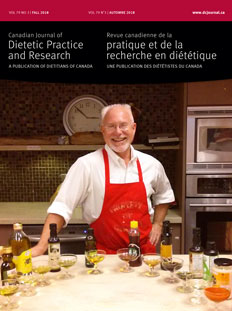Listen… and Speak: A Discussion of Weight Bias, its Intersections with Homophobia, Racism, and Misogyny, and Their Impacts on Health
Abstract
Résumé
INTRODUCTION
Weight loss and the associated discourse
Ontology and epistemology of obesity
Weight bias
BMI as a predictor of risk for chronic disease
Weight bias amongst health professionals
What is really making people sick?
Listen… actions dietitians can take
…And speak: actions dietitians can take
Dietitians are Leaders
CONCLUSION
Acknowledgements
Footnote
References
Information & Authors
Information
Published In

History
Copyright
Authors
Metrics & Citations
Metrics
Other Metrics
Citations
Cite As
Export Citations
If you have the appropriate software installed, you can download article citation data to the citation manager of your choice. Simply select your manager software from the list below and click Download.
Cited by
View Options
View options
Login options
Check if you access through your login credentials or your institution to get full access on this article.
Subscribe
Click on the button below to subscribe to Canadian Journal of Dietetic Practice and Research


